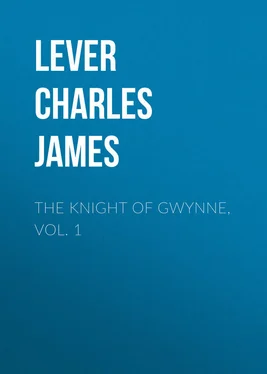Charles Lever - The Knight Of Gwynne, Vol. 1
Здесь есть возможность читать онлайн «Charles Lever - The Knight Of Gwynne, Vol. 1» — ознакомительный отрывок электронной книги совершенно бесплатно, а после прочтения отрывка купить полную версию. В некоторых случаях можно слушать аудио, скачать через торрент в формате fb2 и присутствует краткое содержание. Жанр: foreign_antique, foreign_prose, на английском языке. Описание произведения, (предисловие) а так же отзывы посетителей доступны на портале библиотеки ЛибКат.
- Название:The Knight Of Gwynne, Vol. 1
- Автор:
- Жанр:
- Год:неизвестен
- ISBN:нет данных
- Рейтинг книги:3 / 5. Голосов: 1
-
Избранное:Добавить в избранное
- Отзывы:
-
Ваша оценка:
- 60
- 1
- 2
- 3
- 4
- 5
The Knight Of Gwynne, Vol. 1: краткое содержание, описание и аннотация
Предлагаем к чтению аннотацию, описание, краткое содержание или предисловие (зависит от того, что написал сам автор книги «The Knight Of Gwynne, Vol. 1»). Если вы не нашли необходимую информацию о книге — напишите в комментариях, мы постараемся отыскать её.
The Knight Of Gwynne, Vol. 1 — читать онлайн ознакомительный отрывок
Ниже представлен текст книги, разбитый по страницам. Система сохранения места последней прочитанной страницы, позволяет с удобством читать онлайн бесплатно книгу «The Knight Of Gwynne, Vol. 1», без необходимости каждый раз заново искать на чём Вы остановились. Поставьте закладку, и сможете в любой момент перейти на страницу, на которой закончили чтение.
Интервал:
Закладка:
“If the song have a moral, Bodkin – ”
“It has, I pledge my honor it has, your ‘Grandeur.’” said Bodkin.
“Then finish it. Silence there, gentlemen.” And Bodkin resumed his chant: —
“‘Trust me, Squire,’ the dark man cried,
‘I ‘ll follow close and mind you,
Nor however high the fence you ride,
I ‘ll ever be far behind you.’
“And true to his word, like a gentleman
He rode, there ‘a no denying;
And though full twenty miles they ran,
He took all his ditches flying.
“The night now came, and down they sat,
And the Squire drank while he was able;
But though glass for glass the dark man took,
He left him under the table.
“When morning broke, the Squire’s brains,
Though racking, were still much clearer.
‘I know you well,’ said he to his guest,
‘Now that I see you nearer.
“‘You ‘ve play’d me a d – d scurvy trick:
Come, what have I lost – don’t tease me.
Is it my soul?’ ‘Not at all,’ says Nick;
‘Just vote for the Union, to please me.’”
Amid the loud hurrahs and the louder laughter that fol-lowed this rude chant Forester hurried on to his room, fully convinced that his mission was not altogether so promising as he anticipated.
Undeniable in every respect as was the accommodation of his bed-chamber, Forester lay awake half the night, the singular circumstances in which he found himself occupied his thoughts, while at intervals came the swelling sounds of some loud cheers from the party below, whose boisterous gayety seemed to continue without interruption.
CHAPTER IV. THE DINNER-PARTY
It was late on the following day when Forester awoke, nor was it for some time that he could satisfy himself how far he had been an actor, or a mere spectator in the scene he had witnessed the preceding night. The room and the guests were vividly impressed upon his memory, and the excitement of the party, so different in its character from anything he had seen in his own country, convinced him that the sea, narrow as it was, separated two races very unlike in temperament.
What success should he have in this, his first, mission? was the question ever rising to his mind; how should he acquit himself among persons to whose habits of life, thought, and expression he felt himself an utter stranger? Little as he had seen of the party, that little showed him that the anti-Union feeling was in the ascendant, and that, if a stray convert to the Ministerial doctrines was here and there to be found, he was rather ashamed of his new convictions than resolute to uphold and defend them. From these thoughts he wandered on to others, about the characters of the party, and principally of the host himself, who in every respect was unlike his anticipations. He opened his friend Lionel’s letter, and was surprised to find how filial affection had blinded his judgment, – keen enough when exercised without the trammels of prejudice. “If this,” thought he, “be a fair specimen of Lionel’s portrait-painting, I must take care to form no high-flown expectations of his mother and sister; and as he calls one somewhat haughty and reserved in manner, and the other a blending of maternal pride with a dash of his father’s wilful but happy temperament, I take it for granted that Lady Eleanor is a cold, disagreeable old lady, and her daughter Helen a union of petted vanity and capriciousness, pretty much what my good friend Lionel himself was when he joined us, but what he had the good sense to cease to be very soon after.”
Having satisfied himself that he fairly estimated the ladies of the house, he set himself, with all the ingenuity of true speculation, to account for the traits of character he had so good-naturedly conferred on them. “Living in a remote, half-civilized neighborhood,” thought he, “without any intercourse save with some country squires and their wives and daughters, they have learned, naturally enough, to feel their own superiority to those about them; and possessing a place with such claims to respect from association, as well as from its actual condition, they, like all people who have few equals and no superiors, give themselves a license to think and act independent of the world’s prescription, and become, consequently, very intolerable to every one unaccustomed to acknowledge their sovereignty. I heartily wish Lionel had left these worthy people to my own unassisted appreciation of them; his flourish of trumpets has sadly spoiled the effect of the scene for me;” and with this not over gracious reflection he proceeded to dress for the day.
“The squire has been twice at the door this morning, sir,” said Lin wood, as he arranged the dressing apparatus on the table; “he would not let me awake you, however, and at last said, ‘Present my cordial respects to Mr. Forester, and say, that if he should like to ride with the hounds, he’ll find a horse ready for him, and a servant who will show him the way.’”
“And are they out already?” said Forester.
“Yes, sir, gone two hours ago; they breakfasted at eight, and I heard a whipper-in say they ‘d twelve miles to go to the first cover.”
“Why, it appeared to me that they were up all night.”
“They broke up at four, sir, and except two gentlemen that are gone over to Westport on business, but to be back for dinner, they’re all mounted to-day.”
“And what is the dinner-hour, Linwood?”
“Six, sir, to the minute.”
“And it’s now only eleven,” said Forester to himself, with a wearied sigh; “how am I to get through the rest of the day? Are the ladies in the drawing-room, Linwood?”
“Ladies! no, sir; there are no ladies in the house as I hear of.”
“So much the better, then,” thought his master; “passive endurance is better any day than active boredom, and with all respect for Lady Eleanor and her daughter, I ‘d rather believe them such as Lionel paints them, than have the less flattering impression nearer acquaintance would as certainly leave behind it.”
“The old butler wishes to know if you will breakfast in the library, sir?” asked Linwood.
“Yes, that will do admirably; delighted I am to hear there is such a thing here,” muttered he; for already he had suffered the disappointment the host’s appearance had caused him to tinge all his thoughts with bitterness, and make him regard his visit as an act of purgatorial endurance.
In a large and well-furnished library, with a projecting window offering a view over the entire of Clue Bay, Forester found a small breakfast-table laid beside the fireplace. From the aspect of comfort in everything around, to the elegance of the little service of Dresden, with its accompaniment of ancient silver, the most fastidious critic would not have withheld his praise, and the young Englishman fell into a puzzled revery how so much of taste for the refinements of daily life could consort with the strange specimen of society he had witnessed the preceding evening. The book-shelves, too, in all their later acquisitions, exhibited judgment in the works selected, and as Forester ran his eye over the titles, he was more than ever at fault to reconcile such readings with such habits. On the tables lay scattered the latest of those political pamphlets which the great contested question of the day evoked, many of them ably and powerfully written, and abounding in strong sarcasm; of these, the greater number were attacks on the meditated Union; some of them, too, bore pencil-marks and annotations, from which Forester collected that the Knight’s party leanings were by no means to the Government side of the question.
Читать дальшеИнтервал:
Закладка:
Похожие книги на «The Knight Of Gwynne, Vol. 1»
Представляем Вашему вниманию похожие книги на «The Knight Of Gwynne, Vol. 1» списком для выбора. Мы отобрали схожую по названию и смыслу литературу в надежде предоставить читателям больше вариантов отыскать новые, интересные, ещё непрочитанные произведения.
Обсуждение, отзывы о книге «The Knight Of Gwynne, Vol. 1» и просто собственные мнения читателей. Оставьте ваши комментарии, напишите, что Вы думаете о произведении, его смысле или главных героях. Укажите что конкретно понравилось, а что нет, и почему Вы так считаете.












